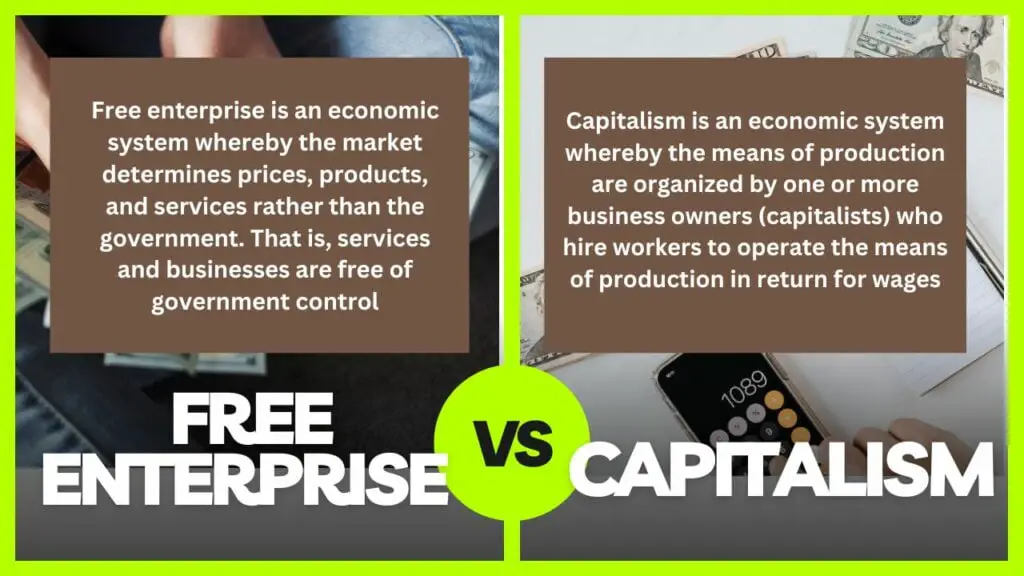Free enterprise and capitalism are two types of economic systems which are often used interchangeably. However, despite their similarities, the differences between free enterprise vs capitalism are evident. Therefore, even though capitalist and free enterprise systems do spring from the same economic soil (which is the law of supply and demand), they are not quite the same thing.
The law of supply and demand is the basis that determines the price and production of goods and services in free enterprise system and capitalism. Nonetheless, a free enterprise system is focused on the exchange of wealth or goods and services whereas capitalism is focused on the creation of wealth and ownership of capital and factors of production. In this article, we will compare free enterprise vs capitalism by their differences and similarities.

Related: Crony Capitalism (Cronyism)
Free enterprise explained
Free enterprise, also known as the free market, is an economic system whereby the market determines prices, products, and services rather than the government. That is, services and businesses are free of government control. In other words, free enterprise could be referred to as a legal or ideological system whereby commercial activities are primarily regulated through private measures.
Free enterprise, in principle, and in practice, is therefore defined by voluntary contracts, private property rights, and competitive bidding for goods and services in the marketplace. This economic system is in contrast to public ownership of property, coercive activity, and controlled or fixed distribution of goods and services.
Free enterprise in western countries is associated with laissez-faire capitalism and philosophical libertarianism. However, free enterprise is different from capitalism because capitalism is a method by which scarce resources are produced and distributed whereas free enterprise refers to a set of legal rules regarding commercial interaction. In conclusion, free enterprise is an unfettered economic activity that occurs where there is an open and free market for the production and barter of goods and services. Hence, entrepreneurs, which are the people who start businesses and take the risks are the backbone of the free enterprise systems.
Related: Mercantilism vs capitalism differences and similarities
Capitalism explained
Capitalism is an economic system whereby private businesses or individuals own capital goods. Under capitalism, business owners (capitalists) employ workers (labor) who do not own the means of production but only receive wages; the workers only use the means of production on behalf of the owners of capital. These workers, do not have any claim on the means of production, nor do they have a claim on the profits generated from their labor. The profits generated belong to the capitalists.
That is, capitalism is an economic system whereby the means of production (i.e. raw materials, factories, machines, tools, etc.) are organized by one or more business owners who hire workers to operate the means of production in return for wages. The production of goods and services under capitalism is dependent on supply and demand in the general market (referred to as market economy), rather than through central planning (referred to as command or planned economy).
Therefore, the purest form of capitalism is laissez-faire capitalism or free market. In this form of capitalism, private individuals are unrestrained as the laissez-faire marketplace operates without checks or controls. The private individuals may determine where to invest, what to produce or sell, and at which prices to exchange the goods and services. However, currently, a majority of countries practice a mixed capitalist system that includes some degree of government regulation of business and ownership of select industries.
In capitalism, private property rights are fundamental. The majority of modern concepts of private property arise from John Locke’s theory of homesteading, in which human beings claim ownership by mixing their labor with unclaimed resources. Once a property is owned, the only legitimate means of transferring it are through voluntary exchange, inheritance, gifts, or re-homesteading of abandoned property. Therefore, private property promotes efficiency by giving the owner of resources an incentive to maximize the value of their property. This means that the more valuable the resource is, the more trading power it gives the owner. Hence, in a capitalist system, the person who owns the property is entitled to any value associated with that property.
Furthermore, one of the characteristics of capitalism relates to capital goods which are goods that are used to manufacture other products such as a machine used on an assembly line. Therefore, a capitalist can mean a person who buys capital goods and uses them to manufacture other products for a profit. This kind of capitalist is usually found in a free enterprise system, though he or she does not require a free enterprise system to survive. They can exist in almost any type of political or economic system as far as a profit is made. In fact, this kind of capitalist usually survives best in a closed enterprise system where there is little or no competition. Hence, governments are capitalists when they own and invest in capital equipment.
The second type of capitalist, on the other hand, is the financial capitalist. Financial capitalism involves the control of resources through the movement and investment of money. This may or may not involve the purchase of capital goods. A financial capitalist normally invests money in company stocks and influences the use of resources by determining what enterprises he will invest in. Also, a financial capitalist may be a banker who is entitled to create inflatable paper money to lend, and who is able to influence the use of resources by how he lends out his ‘created out of nothing‘ money. The financial capitalist does not also require a free enterprise system to survive and usually benefits from monopolies.
Check out: 5 characteristics of capitalism and the effects
Free enterprise vs capitalism differences
Even though free enterprise and capitalism are usually equated, they shouldn’t be. Capitalism vs free enterprise differs in some ways even though they often co-exist. Free enterprise and capitalism frequently come into conflict with one another because free enterprise tends to favor free and open markets accessible to any entrepreneur and capitalism tends to move in the direction of monopoly.
Therefore, one of the major differences between free enterprise vs capitalism is that free enterprise or free markets do not define capitalism, although they are an essential part of it. Capitalism refers more to the production of wealth, while free enterprise focuses more on the exchange of wealth in various methods.
Capital may be an essential basic element for both free enterprise and capitalism. Free competition, on the other hand, is not an essential element of capitalism but of free enterprise. This is because capital owners in capitalism, have a lot of dominance over the means of production and due to this may yield unfair influence.
Table showing the differences between free enterprise vs capitalism
| Factors for comparison | Free enterprise | Capitalism |
|---|---|---|
| Definition | This is an economic system in which prices are determined by unrestricted competition between privately owned businesses | This is an economic system in which a country’s industry and trade are controlled by private owners for profit, rather than by the state |
| Focus | Free enterprise focuses on the exchange of wealth, or goods and services | Capitalism focuses on wealth creation as well as ownership of capital and factors of production |
| Competition | Free enterprise leads to free competition in the economy | Capitalism can have a monopoly on the market and prevent free competition |
| Use of capital | Capital is employed to optimal use because there is minimal or no influence at all in a free market economy | In capitalism, the free market will determine the price, thus the concentration of capital and means of production in a handful of individuals or companies distorts the supply side of the free market model |
| Essential element | Under free enterprise, capital and free competition are an essential elements | Under capitalism, capital is an essential element but free competition is not |
Read also: Capitalism examples and theory
Free enterprise vs capitalism similarities
- One of the similarities between capitalism vs free enterprise is the right to trade; individuals are free to use their right to trade, provided as part of ownership.
- A common similarity between free enterprise vs capitalism is that they are both economic systems where supply and demand are the main factors of price and production of goods and services
- They are both based on the law of supply and demand.
- Capital is an essential basic element for both free enterprise and capitalism.
Check out: Mercantilism vs communism differences and similarities
Can you have a free enterprise system without capitalism?
Yes, a free enterprise can exist without capitalism. It can exist under socialism, as far as there is an absence of forced (coerced) transactions or conditions on transactions. Free enterprise systems can also exist without capitalism in other sorts of communal or mutualistic societies, such as those that Native American tribes had.
With that being said, it is possible to have a capitalist economy without complete free enterprise, and is also possible to have a free market without capitalism. Any economy is a capitalist economy as far as the factors of production are controlled by private individuals. However, a capitalist economy can still be regulated by government laws and the profits of capitalist endeavors can still be taxed heavily.
Free enterprise, on the other hand, can roughly be translated to mean economic exchanges free of oppressive government influence. Private property rights still exist in this system, though the private property may be voluntarily treated as communal without a government mandate. Hence, free enterprises are more likely to grow and thrive in a system where property rights are well protected and individuals have the motivation to acquire, invest, build, and pursue profits.
In conclusion, a society can be capitalist and yet not have free markets. That is, it can limit rights to trade for certain trades, but still keep intact all other rights provided through ownership. Conversely, a society can also have free enterprise and yet not be completely capitalist as they can extend the right to trade, without providing rights of ownership to individuals. The other rights may be extended to collections of individuals. Therefore, a society can mix and match till it reaches some mixture acceptable to the majority in society.
Check out: What is mercantilism? examples and theory
Last Updated on November 4, 2023 by Nansel Nanzip BongdapObotu has 2+years of professional experience in the business and finance sector. Her expertise lies in marketing, economics, finance, biology, and literature. She enjoys writing in these fields to educate and share her wealth of knowledge and experience.
